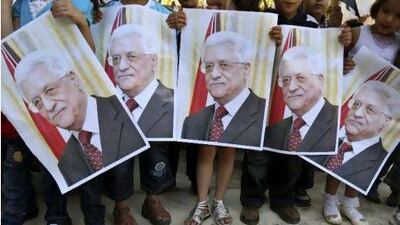TEL AVIV // Israel's prime minister promised yesterday to work closely with the United States to scupper the Palestinians' bid for UN recognition of their statehood.
Benjamin Netanyahu's threat came just two days after Mahmoud Abbas, the president of the western-backed Palestinian Authority, announced that despite deep US and Israeli opposition, he will apply for full membership at the Security Council.
According to some media reports, Mr Abbas may submit as soon as today the statehood resolution to Ban Ki-moon, the UN secretary-general, who would then pass it to the Security Council.
The Palestinian plan has spurred controversy in recent months as it encountered aggressive diplomatic lobbying by Mr Netanyahu, who has argued that it would further stall the already deadlocked peace talks. The US, Israel's most powerful ally, also opposes the Palestinian move and has said it will veto the statehood bid should it come up for a vote in the 15-member Security Council.
It remains unclear whether the vote will take place this week or be delayed amid the diplomatic efforts to block it.
Yesterday's remarks by Mr Netanyahu, made to government ministers before the weekly cabinet meeting, suggest the right-wing Israeli prime minister will intensively battle any such statehood recognition when he travels to New York on Tuesday.
Mr Metanyahu said: "The activity of the US, which is deeply cooperating with us, as well as the activity of other governments with which we are co-operating, will result in a failure of this attempt."
The flurry of diplomatic meetings expected to take place in New York over the Palestinian plan, including one between Mr Netanyahu and Barack Obama, the US president, on Wednesday, comes just days before the speeches on Friday by Mr Netanyahu and Mr Abbas at the UN General Assembly.
The US, seeking to avoid vetoing the Palestinian proposal, has made a last-minute effort in recent weeks to dissuade the Palestinians from pursuing full UN membership.
Late last week, the White House sent two US envoys to the Middle East, David Hale and Dennis Ross, to meet the Palestinian leadership and propose alternatives.
Israeli media have reported that the US proposals included resuming peace talks with Israel and setting a one-year deadline for achieving a pact, while another offer called for pressing Israel to accept the pre-1967 borders as a starting point for negotiations over the frontiers of a future Palestinian state.
Mr Netanyahu has so far rejected that idea, saying the borders of Israel before the 1967 Middle East War, in which it occupied territories including the West Bank and Gaza Strip, were indefensible.
On Friday, Mr Abbas condemned the US attempts as insufficient.
The next day, Nabil Shaath, a top Palestinian official, suggested that blocking the quest for UN recognition could prompt protests in the West Bank.
He said the wave of massive pro-democracy demonstrations across the Arab world should prompt the US to reconsider its planned veto.
Mr Shaath also suggested that the Palestinian leadership was open to proposals by saying that Mr Abbas "left a door open at the end".
Indeed, yesterday, representatives of the so-called Middle East Quartet - made up of the US, European Union, UN and Russia - were due to meet in New York to discuss how to avoid a confrontation between Israelis and Palestinians this week.
The Palestinian bid is also stirring up tensions between the secular Fatah movement, which is headed by Mr Abbas and holds sway in the West Bank, and the Islamic Hamas group, which rules Gaza. Yesterday, Khalil Al Hayya, a Hamas official in Gaza, said that Mr Abbas's plan to ask for UN recognition of a state within the pre-1967 borders, which means the West Bank and Gaza, with East Jerusalem as the capital, did not go far enough, according to Agence France-Presse.
Mr Al Hayya said the UN should recognise a Palestinian state on all of historical Palestine, including what is now Israel.
Hamas in April signed a reconciliation deal with Fatah, although the pact has not yet been implemented.

